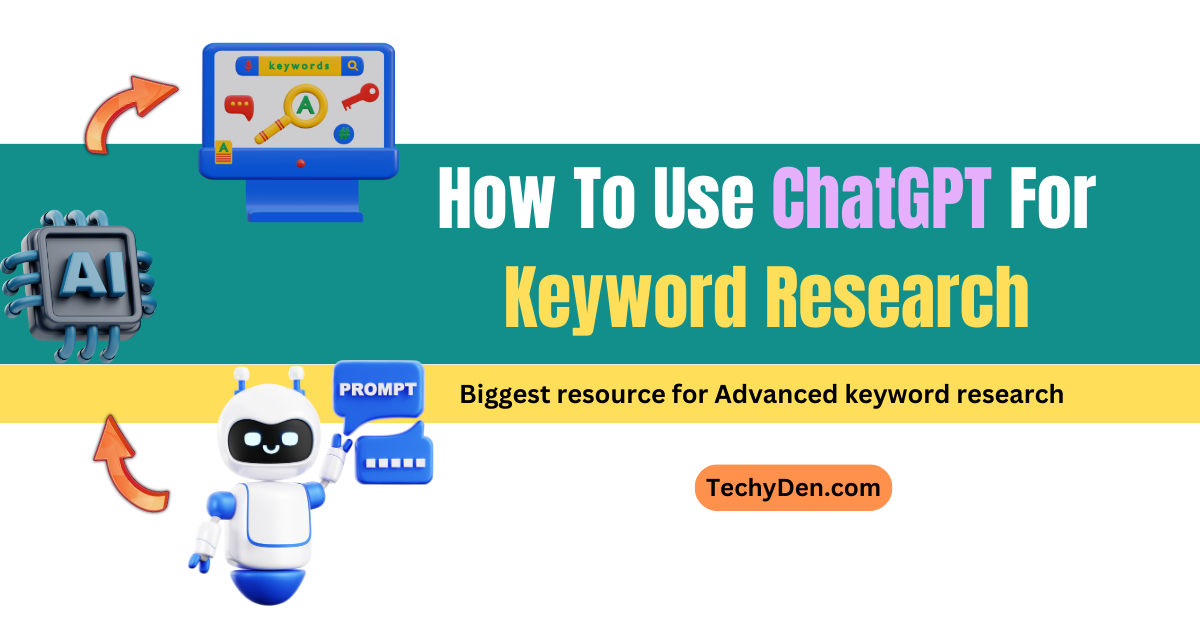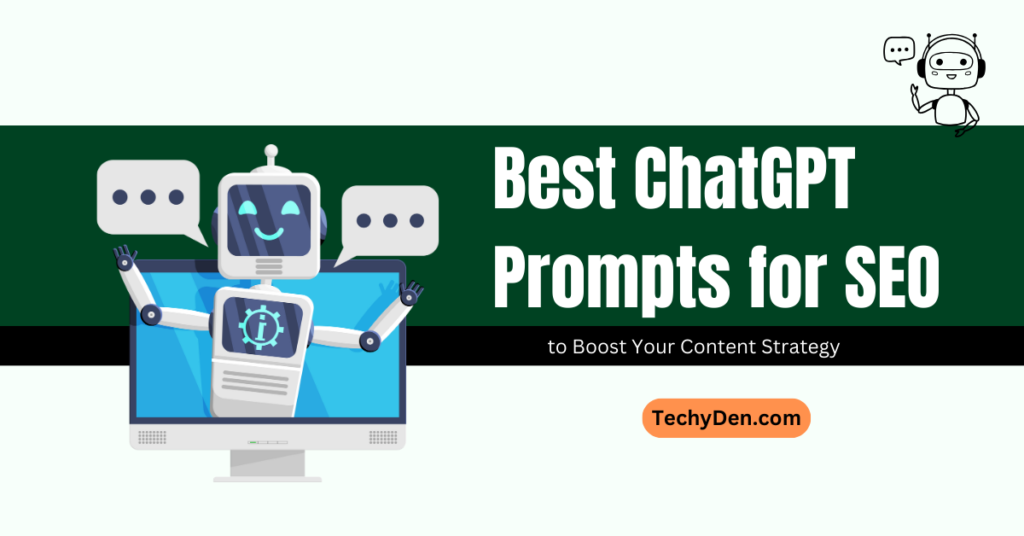Are you planning to use ChatGPT for keyword research for SEO? If yes, you landed in the right place.
In the ever-evolving digital marketing landscape, keyword research remains critical to any successful SEO strategy. With the rise of AI-powered language models like ChatGPT, identifying and analyzing potential keywords has become more streamlined and efficient.
In this comprehensive guide, we’ll explore leveraging ChatGPT’s capabilities for effective keyword research, unlocking new opportunities to boost your website’s visibility and drive targeted traffic.
Role of ChatGPT in Keyword Research
OpenAI created ChatGPT, a sophisticated language model that can comprehend and produce text that resembles that of a human. This powerful AI system has been trained on a large amount of data, allowing it to understand and provide insights into a variety of topics, including keyword research.
The ability of ChatGPT to quickly analyze and process massive amounts of data, spotting patterns and trends that conventional keyword research methods might miss, is a major benefit of using it for keyword research.
ChatGPT’s natural language processing capabilities also enable it to understand the context and intent behind search queries, providing more relevant and complex keyword suggestions.
Getting Started with ChatGPT for Keyword Research
Before diving into the specifics of using ChatGPT for keyword research, it’s essential to understand the basics of interacting with the AI language model.
ChatGPT operates through a conversational interface, where you can input prompts or questions and receive responses in natural language.
First, visit the ChatGPT website or access the AI model through compatible platforms or applications.
Once you’ve initiated a conversation, you can ask ChatGPT to assist with various aspects of keyword research, such as generating keyword ideas, analyzing search volumes, or assessing keyword difficulty.
a. Generating Keyword Ideas with ChatGPT
One of the primary use cases for ChatGPT in keyword research is generating a comprehensive list of relevant keywords for your business, products, or services. By leveraging ChatGPT’s natural language processing capabilities, you can obtain diverse keyword suggestions based on your input.
To generate keyword ideas with ChatGPT, you can briefly describe your business, website, or the topic you want to target.
For example, you might input something like,
“I run an e-commerce website selling organic skincare products. Can you suggest some relevant keywords for my website?”
ChatGPT will then analyze your input and provide the following:
- A list of potential keywords.
- Taking into account factors such as relevance.
- Search intent.
- Competition.
The AI model may also suggest related phrases, long-tail keywords, or variations of your initial query.
b. Analyzing Keyword Search Volumes and Trends
In addition to generating keyword ideas, ChatGPT can assist in analyzing search volumes and trends for specific keywords. This information is crucial for understanding each keyword’s potential reach and competitiveness, allowing you to prioritize your keyword-targeting efforts.
To analyze search volumes and trends with ChatGPT, you can ask the AI model to provide this data for a particular keyword or set of keywords.
For example, you might input,
“Can you estimate the monthly search volume and trend data for the keyword ‘organic skincare products’?”
ChatGPT will then utilize its access to search data and provide you with relevant insights, such as the approximate monthly search volume, year-over-year trends, and any seasonal or regional variations in search patterns.
c. Assessing Keyword Difficulty and Competition
Another important aspect of keyword research is assessing the difficulty and competition levels associated with specific keywords. This information helps you determine the feasibility of ranking specific keywords and guides your overall SEO strategy.
ChatGPT can assist in evaluating keyword difficulty and competition by analyzing various factors, such as the authority and relevance of the top-ranking websites for a given keyword, the number of competing pages, and the overall competitiveness of the search landscape.
To leverage ChatGPT, you can input a prompt like,
“Can you assess the difficulty and competition level for the keyword ‘organic skincare products’ and provide recommendations on how to approach this keyword?”
ChatGPT will then analyze the competitive landscape, considering domain authority, content quality, backlink profiles, and other relevant metrics.
Based on this analysis, the AI model can provide insights and recommendations on whether the keyword is feasible to target and what strategies you might employ to improve your chances of ranking well.
d. Incorporating LSI and Related Keywords
In addition to generating and analyzing primary keywords, ChatGPT can also assist in identifying and incorporating Latent Semantic Indexing (LSI) keywords and related keywords into your content strategy.
These keywords help search engines better understand the context and relevance of your web pages, improving your rankings and driving more targeted traffic.
To leverage ChatGPT for LSI and related keyword identification, you can provide the AI model with your primary keyword or a brief description of your content topic.
ChatGPT will then suggest relevant LSI keywords and related phrases that can be naturally incorporated into your content to enhance its topical relevance and improve its chances of ranking well for the primary keyword.
For example, if your primary keyword is “organic skincare products,”
ChatGPT might suggest LSI keywords, like
Natural skin care,Chemical-free skincare,Organic beauty products,Non-toxic skincare,Herbal skincare,Eco-friendly skincare,Vegan skincare products,Cruelty-free skincare,Sustainable beauty,Botanical skincare,Green beauty,Organic face cream,Natural moisturizer,Organic anti-aging products

e. Optimizing Content with ChatGPT’s Suggestions
Once you’ve gathered a comprehensive list of keywords, search volumes, difficulty assessments, and related phrases from ChatGPT, you can use this information to optimize your website’s content and improve its search engine visibility.
- Incorporate the most relevant and high-potential keywords into your page titles, meta descriptions, headings, and body content while ensuring the content remains natural and engaging for your target audience.
- Additionally, incorporate LSI and related keywords throughout your content to reinforce its topical relevance and provide additional context for search engines.
- Remember, however, that while ChatGPT can be an important tool for keyword research, it should not be the sole source of information.
It’s always important to cross-reference the AI model’s suggestions with other reputable keyword research tools and industry best practices to ensure the accuracy and relevance of your data.
FAQs: Using ChatGPT for Keyword Research
Can ChatGPT completely replace traditional keyword research tools?
While ChatGPT is a powerful tool for keyword research, it should not be considered a complete replacement for traditional keyword research tools. ChatGPT’s abilities are based on its training data and language model, which may not always be up-to-date or as comprehensive as dedicated keyword research platforms. Using ChatGPT with other tools and resources is best for gaining a well-rounded perspective on keyword opportunities and trends.
How accurate are ChatGPT’s keyword suggestions and search volume estimates?
The accuracy of ChatGPT’s keyword suggestions and search volume estimates can vary depending on the quality and recency of the training data to which it was exposed. While the AI model strives to provide accurate information, it’s essential to cross-reference its suggestions with other reliable sources and tools to ensure their validity and timeliness.
Can ChatGPT suggest keywords in multiple languages?
Yes, ChatGPT can suggest keywords in multiple languages if those languages are included in its training data. However, the quality and accuracy of its suggestions may vary depending on the language and the amount of data available for that language during training.
How does ChatGPT assess keyword difficulty and competition levels?
ChatGPT assesses keyword difficulty and competition levels by analyzing various factors, such as the authority and relevance of the top-ranking websites for a given keyword, the number of competing pages, and the overall competitiveness of the search landscape. It considers metrics like domain authority, content quality, backlink profiles, and other relevant signals to provide insights and recommendations.
Can ChatGPT suggest long-tail or specific keywords (e.g., informational, transactional, or navigational)?
Yes, ChatGPT can suggest long-tail keywords and specific types of keywords based on the context and intent of your query. ChatGPT can generate keyword suggestions tailored to different search intents, such as informational, transactional, or navigational queries, by providing relevant details about your target audience, products, or services.
List of Best ChatGPT Prompts for Keyword Research
Here are some of the best ChatGPT prompts you can use for keyword research:
| Prompt | Purpose |
|---|---|
| Generate a list of relevant keywords for [your industry/niche/topic]. | Get a broad list of keyword ideas related to your specific area of focus. |
| Suggest long-tail keyword variations for [your primary keyword]. | Uncover more specific, long-tail keyword opportunities that can drive targeted traffic. |
| Analyze the search volume and trends for the following keywords: [list your keywords]. | Gain insights into the search volumes and trends for the keywords you’re considering to prioritize efforts. |
| Assess the difficulty and competition level for the keyword [your keyword]. | Evaluate the competitiveness of a particular keyword, considering factors like domain authority and content quality. |
| Provide LSI (Latent Semantic Indexing) keywords and related phrases for [your primary keyword]. | Identify semantically related keywords and phrases to enhance the topical relevance of your content. |
| Suggest informational, transactional, and navigational keywords related to [your product/service]. | Generate keyword ideas tailored to different search intents: informational, transactional, and navigational. |
| Generate a list of question-based keywords relevant to [your topic]. | Uncover potential question-based keywords that users might be searching for. |
| Provide keyword suggestions for local SEO targeting [your location/city]. | Identify location-specific keyword opportunities for local SEO. |
| Analyze the keyword landscape for [your industry/niche] and suggest potential gaps or opportunities. | Evaluate the overall keyword landscape in your industry or niche and identify potential gaps or opportunities. |
| Suggest ways to incorporate the following keywords naturally into my content: [List your keywords]. | A guide to seamlessly integrating your target keywords into your content without compromising readability. |
Final words on using ChatGPT for keyword research
By using ChatGPT’s power for keyword research, you can unlock new opportunities to optimize your website’s content, improve search engine visibility, and drive targeted traffic to your business. However, it’s crucial to remember that while ChatGPT is a valuable tool, it should be used with other keyword research resources and industry best practices to ensure a well-rounded and effective SEO strategy.
Remember, while ChatGPT can be a powerful tool for keyword research, it’s always a good practice to cross-reference its suggestions with other keyword research tools and resources to ensure accuracy and stay up-to-date with the latest trends and changes in the search landscape.
The above-included ChatGPT prompts help you make your keyword research process easier. Share this article about how to use ChatGPT for keyword research on social media.







